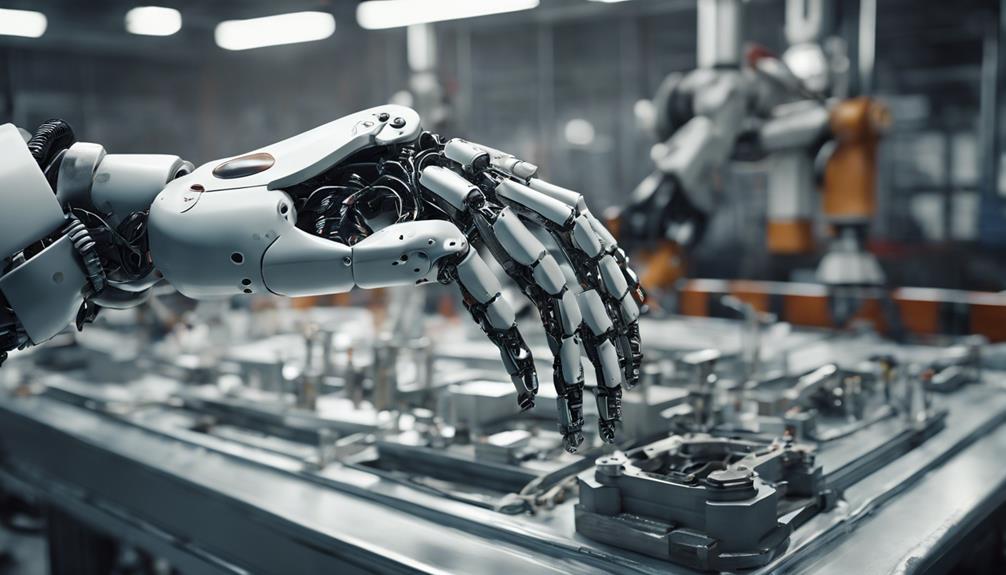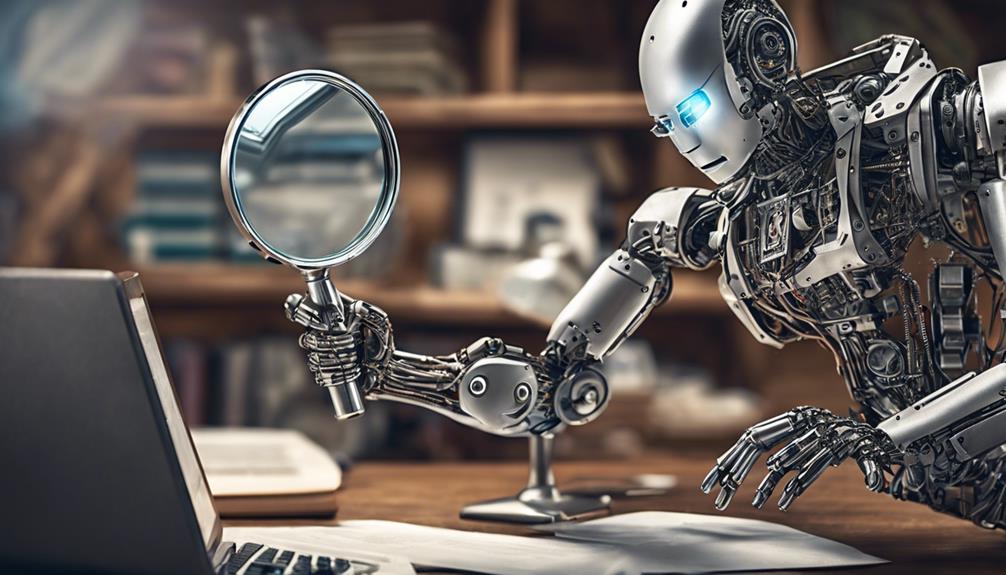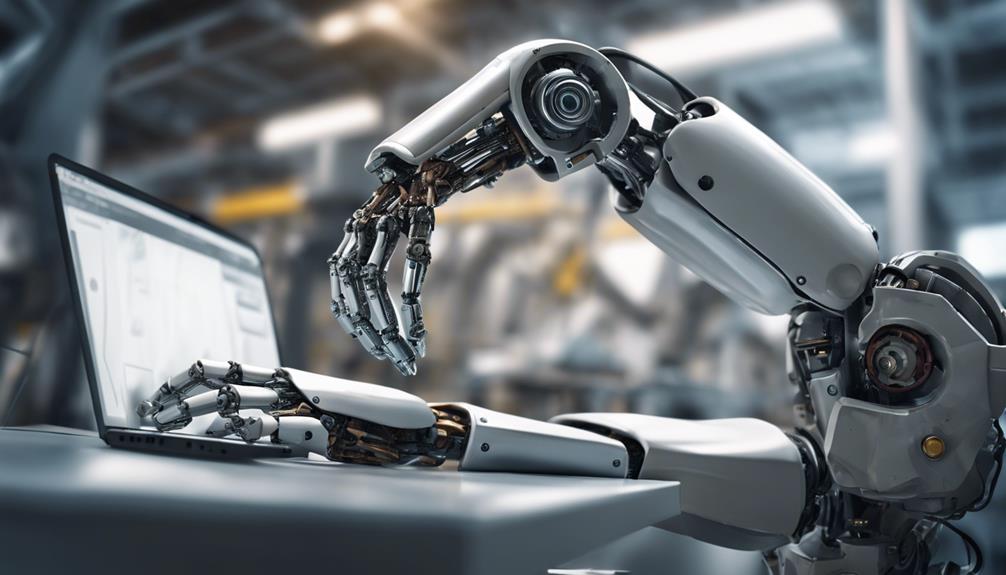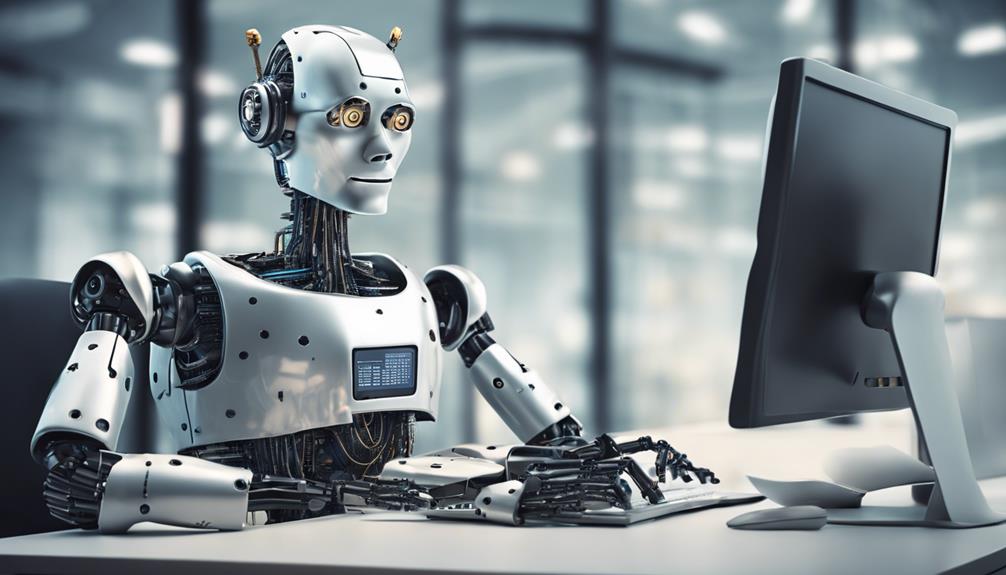As artificial intelligence advances, job seekers are growing more apprehensive about its impact on the job market.
The guide 'How AI Will Replace Human Jobs: A Guide for Job Seekers' provides a comprehensive analysis of the industries and roles most susceptible to automation. However, it also sheds light on the areas where human skills remain indispensable.
Understanding this shifting dynamic is crucial for individuals navigating the evolving job market. This guide offers valuable insights for those seeking to future-proof their careers in the age of AI.
Key Takeaways
- Upskill in tech and soft skills for job market competitiveness.
- Embrace AI benefits while preparing for job role shifts.
- Specialize in areas where human expertise is valued over automation.
- Stay adaptable, learn continuously, and understand AI-human interaction.
Impact of AI on Job Market
The impact of AI on the job market is profound and far-reaching, with projections indicating that 85 million jobs globally may be replaced by AI by 2025. As artificial intelligence continues to evolve, there is a growing concern about its potential to reshape the workforce landscape.
While AI has the capacity to automate certain tasks, it is crucial to note that not all jobs are equally vulnerable to replacement. Jobs that involve routine, repetitive tasks are more likely to be automated, while those requiring complex decision-making, creativity, and human interaction are less susceptible.
Industries reliant on data analysis, such as finance and healthcare, may see a shift in job roles as AI takes over data processing tasks. Workers will need to adapt by acquiring new skills that complement AI technologies to remain competitive in the evolving job market. Understanding the interplay between AI and human workers is essential for navigating the changing job landscape effectively.
Jobs Vulnerable to AI Displacement

Analyzing the susceptibility of various occupations to displacement by AI reveals specific job roles at higher risk of automation. Customer service representatives face job displacement as automation and chatbots handle inquiries more efficiently.
The advancement of autonomous vehicles poses a threat to car and truck drivers, with AI technology reducing the need for human intervention. Computer programmers may find their roles at risk as AI tools like ChatGPT automate coding tasks.
Research analysts and paralegals also confront the potential impact of AI on their job security, with tasks that involve data analysis and legal document review becoming more automated.
As AI continues to evolve, job roles that involve routine tasks or data processing are increasingly vulnerable to displacement. Job seekers in these fields must adapt by acquiring skills that complement rather than compete with AI technology to ensure their employability in the changing job market.
AI Benefits and Challenges for Job Seekers
Given the imminent changes in job roles due to AI displacement, understanding the benefits and challenges AI presents for job seekers is crucial in navigating the evolving employment landscape. AI's impact on job seekers encompasses a range of facets that shape the future of work:
- Enhanced Workplace Efficiency: AI automates repetitive tasks, leading to streamlined operations and increased productivity within organizations.
- Creation of New Job Roles: The rise of AI gives birth to specialized positions like machine learning engineers and AI ethics specialists, offering job seekers opportunities in emerging fields.
- Essential Role of Human Workers: While AI can replace certain job functions, human workers remain indispensable for training, monitoring, and ensuring the ethical use of AI systems.
Understanding these dynamics is essential for job seekers to adapt to the changing job market and position themselves advantageously in a landscape where AI plays an increasingly prominent role.
Strategies for Job Seekers Facing AI

In navigating the impact of AI on the job market, job seekers must proactively develop adaptive strategies to stay competitive and relevant in evolving industries. Embracing lifelong learning is crucial to adapt to changing job market demands influenced by AI.
Job seekers should focus on developing soft skills that AI cannot easily replicate, such as creativity, empathy, and complex problem-solving. Additionally, specializing in niche areas where human expertise is still valued over AI automation can provide a competitive edge.
Familiarizing oneself with AI technologies through everyday use is essential to stay ahead in the job market. Institutions like Nexford University offering AI specialization programs can help job seekers enhance their skills for AI-integrated roles.
Future Job Market Trends With AI
Examining the transformative impact of AI on the job market reveals compelling insights into future trends and opportunities for professionals. The job market landscape is undergoing significant changes due to AI technologies, promising both challenges and prospects for job seekers.
- AI automation is expected to reshape job roles, leading to the emergence of new positions that require advanced technological skills.
- Skill requirements are evolving rapidly with the integration of AI, emphasizing the need for professionals to upskill and adapt to the changing job market demands.
- Global economic activity is set to soar with the projected $13 trillion addition by 2030, indicating a substantial impact on future job opportunities and the overall job market scenario.
These trends highlight the necessity for individuals to stay abreast of AI advancements, develop relevant skills, and remain agile in navigating the evolving job market influenced by AI technologies.
Frequently Asked Questions
How Will AI Replace Human Work?
AI will replace human work through automation and advanced algorithms that can perform tasks more efficiently and accurately. By leveraging machine learning and AI technologies, businesses can streamline operations, reduce costs, and enhance productivity across various industries.
What Jobs AI Will Replace?
AI is reshaping the job market by replacing roles in customer service, driving, programming, analysis, and legal support. As technology advances, tasks traditionally performed by humans are being automated, requiring individuals to adapt and acquire new skills to remain competitive.
What Jobs Will Be Gone by 2030?
By 2030, jobs such as customer service representatives, car and truck drivers, computer programmers, research analysts, and paralegals are at risk of being replaced by AI technologies due to advancements in automation and artificial intelligence systems.
How Many Jobs Lost Due to Ai?
An estimated 85 million jobs globally are projected to be replaced by AI by 2025. This figure rises to around 300 million full-time jobs in the future. Two-thirds of U.S. and European jobs are at risk of automation, impacting industries significantly.
Conclusion
In light of the advancing technology of artificial intelligence, job seekers must adapt to the changing landscape of the job market.
While some roles are at risk of automation, opportunities for growth and innovation in new job roles are emerging.
By embracing lifelong learning and agility in acquiring new skills, individuals can navigate the challenges posed by AI integration and position themselves for success in the future job market.









